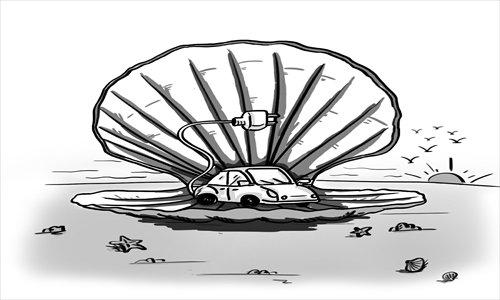China’s EV policy approach in need of a tune-up

Illustration: Chen Xia/GT
When many of the world's leading carmakers gaze into the future, they see a market dominated by electric vehicles (EVs). Policymakers and planners around the world have jumped on board the EV revolution and are rolling out measures designed to give their local carmakers a head start in this emerging market. China can't ignore this trend - it too needs to position its own manufacturers near the front of the race.
There is a consensus within the auto industry that it will take another decade for EVs to enter the mainstream market. With the market still in its infancy, rigid industrial standards and intellectual property barriers have not yet taken root with EVs the same way they have with conventionally powered vehicles. China's auto industry can wait around for the foreign market to mature and then mimic the success stories which emerge overseas. But by remaining passive, Chinese vehicle makers will continue to lag behind their more assertive Western counterparts.
The current incubation stage offers the best opportunity for Chinese car manufacturers to pull ahead in tomorrow's global EV market. The industry needs clear strategic vision directed toward the mass production and application of electric cars. This is what the car market of the future will demand. Achieving this lofty aim will not be easy - the competition along the way will be fierce and the investment demands will be heavy, but those that survive the trial-by-fire will be well-placed to lead the next era of the automotive industry.
To jump-start innovation in China, the industry needs new players. The current excitement surrounding EVs didn't come from Ford, General Motors or any other established carmaker. It came from Tesla Motors, the Silicon Valley-based company co-founded by tech guru Elon Musk. Tesla succeeded in the development of an alternative technology in part because it was not shackled to old assets and paradigms.
In China though, it's hard to see a dark horse staging a Tesla-style breakthrough. The government's industrial policies involve supporting key enterprises, setting development goals and establishing industry entry thresholds to guard against excessive competition. With administrative barriers gating off market access, what are the odds that new and novel technologies will get off the ground?
At the same time, the inconvenience and expense of owning an EV in China means that the market needs a reason to consider these vehicles. Various local governments have offered subsidies to EV purchasers, but the industry can't rely long-term on financial inducements to prop up demand.
The history of the Toyota Prius - the world's first mass-market alternative-drive car - stands here as a cautionary tale. Although the Prius succeeds in terms of energy savings, the cost of owning one would be prohibitive for many drivers were it not for the subsidies and tax credits doled out in many localities over the past decade.
Ultimately carmakers need to figure out what kinds of products will be well received by the market. With EVs still accounting for such a small percentage of overall car sales, the key at this stage of the game will be connecting with the right customers. Tesla succeeded in this regard by creating an upmarket vehicle which can appeal to high-income luxury and sports car consumers.
With gasoline- and diesel-powered vehicles still wielding so much influence over consumers, measures that steer buyers toward more environmentally friendly cars are essential. Policy setters in China should cautiously select measures that can deliver sustainable results. Officials in the US, Germany, France, Italy and Japan have all rolled out regulations which encourage production and sales of EVs without diluting market competition. For example, California's zero-emission mandate, which calls for more shipments of zero-emission vehicles, could serve as a policy example for Chinese planners. This mandate not only illustrates the local government's commitment to improving air quality but also subsidizes green cars in a sustainable way without putting undue fiscal pressure on the state.
The article was compiled by Global Times reporter Wang Jiamei based on a speech made by Chen Qingtai, research fellow and former vice president of the Development Research Center of the State Council at the CEIBS 11th Annual China Automotive Industry Forum 2013. bizopinion@globaltimes.com.cn